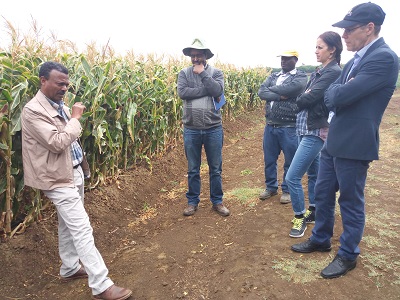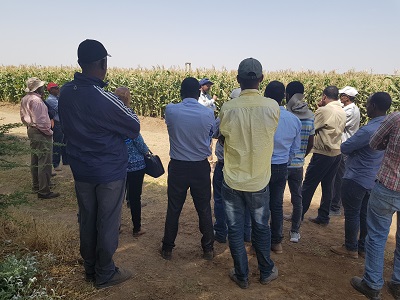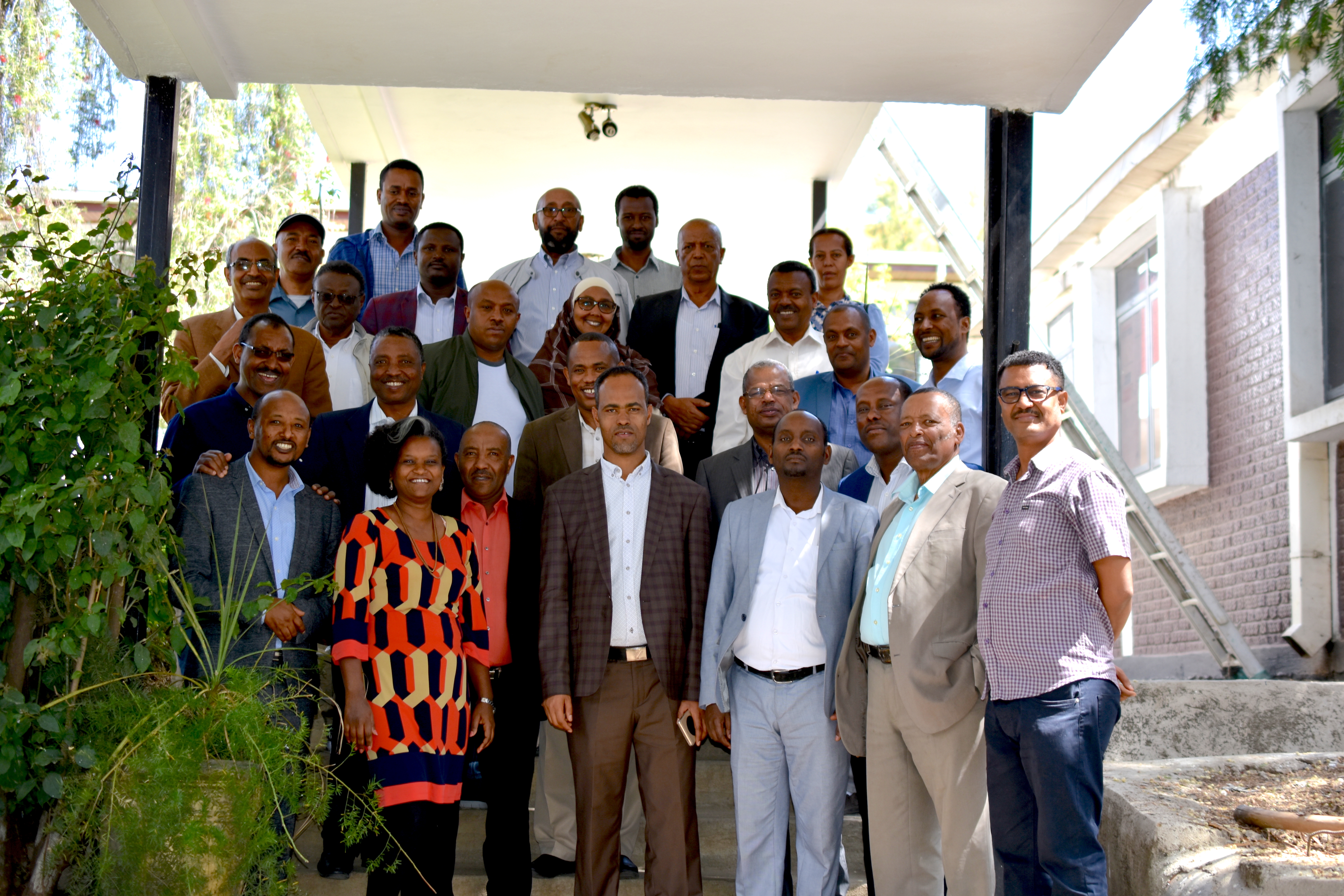
Recently, the International Maize and Wheat Improvement Center (CIMMYT)-led, Government of Canada’s Global Affairs Canada (GAC)-funded, Nutritious Maize for Ethiopia (NuME) project has led field visits for a number of high-level stakeholders.
On April 11, 2018 representatives from the Embassy of Canada in Ethiopia, Ivan Roberts, Head of Development Cooperation and Carolyn MacLeod, Development Team leader for Human Development, Environment and Agriculture, visited the Ethio Veg Fru Farm, one of the main field sites of the NuME project.
“We were very much interested and happy to see such a success story as the Ethio Veg Fru Farm,” said MacLeod. Roberts and MacLeod both said they appreciated the efforts made by the NuME project in working collaboratively with private seed companies to fill the seed shortage of QPM varieties. They were also happy with the field performance of the crop under production.
MacLeod said she looked forward to continued collaboration with CIMMYT and indicated continued support to projects such as NuME under the International Assistance Policy of Canada, in which agricultural development must benefit women and girls.
The NuME project’s goal is to bring nutritious, quality protein maize (QPM) to rural maize producers in the Ethiopian maize belt and beyond.
Maize lacks two essential amino acids – lysine and tryptophan, making maize protein less useful for humans. In the southern region of Ethiopia, where maize accounts for more than 60 percent of the dietary protein intake, an estimated 85 to 90 percent of the population – especially young children and women – are at risk of inadequate lysine intake and protein deficiency.
In Ethiopia, maize now ranks first among cereals for production, and second in area planted. Ethiopian families increasingly rely on maize as a staple due to its higher productivity and lower production costs, compared to other cereals.
QPM looks and tastes the same as normal maize but contains up to twice as much lysine and tryptophan. Studies have shown that children who consume QPM grow roughly 10 percent more in both height and weight.
Over the last few years the Ethiopian government has been stepping up nutrition interventions targeting women and children, with aims for a 3 percent annual reduction in the number of stunted and underweight children. As part of this initiative, the Ethiopian government allocates around 10 percent of the total national budget to agriculture, and the Ministry of Agriculture and Natural Resource (MoANR) has officially made QPM part of their extension agenda.
The EthioVeg Fru Farm Plc., with the financial and technical support of the NuME Project, is multiplying parental lines of BHQPY545 under irrigation. BHQPY545, developed from CIMMYT lines, is a highly popular single cross QPM hybrid released by the Ethiopia Institute of Agricultural Research.
Although the variety has been quite popular, seed companies have been reluctant to produce and market the seed due to it low seed-yield potential, making it more difficult for seed companies to produce a sufficient supply. Due to the stigma of low seed-yield, NuME organized a high-level field day on March 27, 2018 to demonstrate the genetic potential of the parental lines and effectiveness offseason maize seed multiplication with irrigation.

Visitors to the field day included the state minister for agricultural development from MoANR, Tesfaye Mengiste, general managers of public and private seed companies and a Farmers’ Cooperative Union that work in partnership with the NuME project.
Mengiste stressed maize as the number one strategic food crop for the country as it is the most produced and consumed cereal. He thanked NuME for bringing QPM technologies to the country and said it has to be up to the extension system now to reach every farmer.
Impressed by the field performances he saw, Mengiste probed seed company managers about why they have not multiplied seeds during the offseason to overcome seed scarcity and help reach the annual target of 200,000 ha land planted with QPM, approximately 10 percent of land currently devoted to maize production.
Mengiste wondered why there seems to be a QPM seed paradox, where farmers criticize seed unavailability while seed companies complain about the lack of demand. He said that QPM is essential for the national food and nutrition security and urged seed companies to make all possible effort to produce and sell QPM seeds, as part of their responsibility to reach rural smallholder farmers in exchange for government support.
Most seed companies had considered the inbred lines incompetent and weak but the field visit made them realize the potential of the lines, even under high plant density. They were convinced that the poor field performance previously noticed was not due to lack of inherent potential, but to the agro-techniques applied.
The general manager of the South Seed Enterprise (SSE), Ato Belay Hariso said he learned a lot from the field day and will use the experience to produce seed using irrigation during the off-season to fill seed supply shortages.
After seeing the crop in the field and knowing that QPM is useful to curb malnutrition in the country, seed mangers expressed great enthusiasm to increase seed production of BHQPY545 and other QPM varieties.
Mengiste recommended a number of efforts to help increase the scalability of QPM seeds, starting with continued dissemination of QPM varieties by NuME and the governmental extension system until sustainable demand is created. He suggested that seed company managers must seriously plan QPM seed production for the coming main season and perhaps look for more private seed companies, who have the interest and capacity to produce QPM seed to partner with. Mengiste said that seed enterprises should be able to sell all the QPM seed they produce by promoting the nutritional advantages of QPM, with support of the NuME project and the extension system.
The Nutritious Maize for Ethiopia project is funded by Global Affairs Canada (GAC) and implemented by CIMMYT-Ethiopia in collaboration with various stakeholders from agriculture, nutrition and health sectors. The project is designed to contribute to the reduction of malnutrition, especially among women and young children, and to increase food security for resource-poor smallholder farmers in Ethiopia through the widespread adoption, production and utilization of QPM varieties and crop management practices that increase farm productivity.

 Nutrition, health and food security
Nutrition, health and food security 